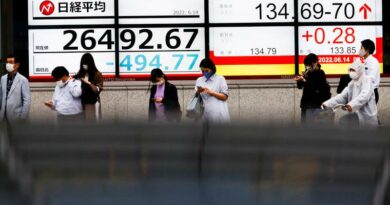Asian Markets Mostly Higher On Global Cues
Asian stock markets are trading mostly higher on Tuesday, following the broadly positive cues from global markets overnight, as traders continued to pick up stocks at reduced levels following heavy selling last week. They are also concerned about the outlook for interest rates as recent economic data has led to worries the Federal Reserve will raise rates more than currently anticipated and hold rates at an elevated level for an extended period. Asian markets closed mostly lower on Monday.
The Australian stock market notably higher on Tuesday, recouping the losses in the previous session, with the benchmark S&P/ASX 200 staying above the 7,200 level, following the broadly positive cues from global markets overnight, with gains across most sectors, led by gains in mining and energy stocks amid firmer commodity prices.
The benchmark S&P/ASX 200 Index is gaining 35.30 points or 0.49 percent to 7,260.10, after touching a high of 7,273.60 earlier. The broader All Ordinaries Index is up 35.60 points or 0.48 percent to 7,455.20. Australian stocks closed sharply lower on Monday.
Among the major miners, BHP Group and Rio Tinto are gaining more than 1 percent each, while Mineral Resources is advancing more than 4 percent, Fortescue Metals is adding almost 3 percent and OZ Minerals is edging up 0.1 percent.
Oil stocks are higher. Beach energy and Santos are gaining more than 1 percent each, while Woodside Energy is advancing almost 2 percent and Origin Energy is edging up 0.5 percent.
Among tech stocks, Afterpay owner Block is losing almost 3 percent and Appen is declining more than 1 percent, while WiseTech Global and Zip are adding almost 1 percent each. Xero is gaining more than 1 percent.
Gold miners are higher. Northern Star Resources and Newcrest Mining are gaining almost 2 percent each, while Gold Road Resources is advancing almost 4 percent, Evolution Mining is adding almost 3 percent and Resolute Mining is up more than 3 percent.
Among the big four banks, Commonwealth Bank and Westpac are edging down 0.2 to 0.3 percent each, while ANZ Banking and National Australia Bank are edging up 0.1 to 0.2 percent each.
In economic news, retail sales in Australia were up a seasonally adjusted 1.9 percent on month in January, the Australian Bureau of Statistics said on Tuesday – coming in at A$35.091 billion. That beat forecasts for an increase of 1.5 percent following the 3.9 percent contraction in the previous month. On a yearly basis, retail sales climbed 7.5 percent.
The ABS also said Australia posted a current account surplus of A$14.114 billion in the fourth quarter of 2022. That beat forecasts for a surplus of A$6.5 billion following the upwardly revised A$753 million in the three months prior (originally a shortfall of A$2.3 billion).
Meanwhile, private sector credit in Australia was up 0.4 percent on month in January, the Reserve Bank of Australia said on Tuesday, up from 0.3 percent in December. On a yearly basis, credit rose from 7.6 percent in December to 8.0 percent in January.
In the currency market, the Aussie dollar is trading at $0.674 on Tuesday.
The Japanese stock market is notably higher on Tuesday, recouping the slight losses in the previous session, with the Nikkei 225 moving above the 27,500 level, following the broadly positive cues from global markets overnight, driven by gains in technology stocks.
The benchmark Nikkei 225 Index closed the morning session at 27,541.40, up 117.44 points or 0.43 percent, after touching a high of 27,585.17 earlier. Japanese shares ended slightly lower on Monday.
Market heavyweight SoftBank Group is gaining more than 1 percent and Uniqlo operator Fast Retailing is also adding more than 1 percent. Among automakers, Honda is gaining more than 1 percent and Toyota is edging up 0.4 percent.
In the tech space, Advantest and Screen Holdings are gaining more than 1 percent each, while Tokyo Electron is edging up 0.2 percent.
In the banking sector, Mitsubishi UFJ Financial is edging down 0.3 percent, while Sumitomo Mitsui Financial and Mizuho Financial are edging up 0.5 percent each.
The major exporters are mixed. Sony is gaining almost 1 percent and Panasonic is edging up 0.3 percent, while Canon is losing almost 1 percent and Mitsubishi Electric is edging down 0.1 percent.
Among the other major gainers, Taiheiyo Cement, Sumitomo Osaka Cement and Yaskawa Electric are gaining more than 3 percent each, while Nippon Paper Industries is adding almost 3 percent.
Conversely, Alps Alpine is losing almost 5 percent and Teijin is declining more than 3 percent.
In economic news, industrial production in Japan was down a seasonally adjusted 4.6 percent on month in January, the Ministry of Economy, Trade and Industry said on Tuesday. That was shy of expectations for a decline of 2.6 percent following the 0.3 percent increase in December. On a yearly basis, industrial output fell 2.3 percent after skipping 2.4 percent in the previous month.
Upon the release of the data, the METI downgraded its assessment of industrial production, saying that it has weakened. According to the METI’s forecast of industrial production, output is expected to jump 8.0 percent in February and rise 0.7 percent in March.
In the currency market, the U.S. dollar is trading in the lower 136 yen-range on Tuesday.
Elsewhere in Asia, New Zealand, China, Hong Kong, Singapore, South Korea and Indonesia are higher by between 0.1 and 1.0 percent each. Malaysia is edging down 0.1 percent. Taiwan is closed for Peace Memorial Day holiday.
On the Wall Street, stocks gave back ground over the course of the trading day on Monday after moving sharply higher early in the session. The major averages pulled back well off their early highs but managed to close in positive territory.
The Dow surged more than 360 points in early trading but ended the day up by just 72.17 points or 0.2 percent at 32,889.09. The Nasdaq climbed 72.04 points or 0.6 percent to 11,466.98 and the S&P 500 rose 12.20 points or 0.3 percent to 3,982.24.
The major European markets also moved to the upside on the day. While the French CAC 40 Index surged by 1.5 percent, the German DAX Index jumped by 1.1 percent and the U.K.’s FTSE 100 Index climbed by 0.7 percent.
Crude oil prices pulled back Monday, handing back recent gains on concerns that higher interest rates will tip the global economy into a recession. West Texas Intermediate crude for April delivery slid $0.64 or 0.8 percent to $75.68 a barrel.
Source: Read Full Article




